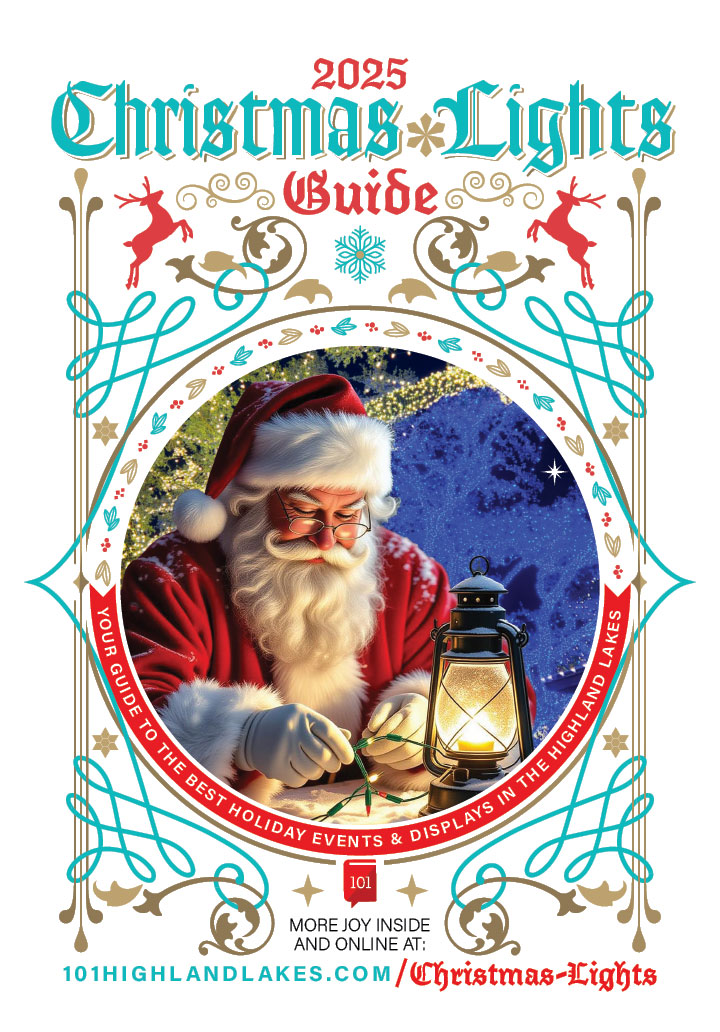
The stars, moon, and Venus shine bright over the Kingsland Slab on the Llano River. To get there, take RR 1431 west through Kingsland then turn west on FM 3404 and stay there for a couple of miles. Staff photo by Jared Fields
The only thing that gives Jim Sheets away is a small, red light perched on his forehead. That and his hurried movement around the Eagle Eye Observatory. He checks his computer then the horizon to the north but isn’t satisfied. A little darker, he says, a little darker.
Sheets, the on-staff astronomer at Canyon of the Eagles Nature Park and Resort on the northeast shore of Lake Buchanan, needs the North Star, Polaris, to show itself just a bit more. The sun dipped below the horizon several minutes ago, but the glow in the west as it makes one last grasp at Lake Buchanan gives off just enough light to keep Polaris suppressed.
But not for long.
“There it is,” Sheet says. “That will do it.”
He rolls the 25-inch Newtonian reflecting telescope toward the North Star and carefully aligns it. Polar alignment, he calls it. Once lined up with the North Star, all Sheets has to do is tap in the star, nebula, planet, galaxy, or any other known object in the night sky, and the computerized telescope goes straight to it.
It’s a lot easier than searching the old-fashioned way.
At the Eagle Eye Observatory, which holds regular astronomy and stargazing programs, Sheets keeps folks who might not know the difference between a supernova and a nebula fixated on the small lights glimmering above.
“I find it fascinating, the universe and space,” he says. “You try to think how big the universe is, really try, you just can’t wrap your mind around it.
“Wow!” Sheets adds as he climbs a small ladder next to the telescope.
Stargazing, or amateur astronomy, is simple in practice: Step outside at night and look up. Far from cities, the clear night sky erupts into lights. Many of those lights, about 40,000 at least, are stars, while the rest are planets, galaxies, and other heavenly objects.
The Highland Lakes boasts great dark skies for fantastic stargazing.
On a perfect night with no moon—even a sliver of one—Eagle Eye Observatory earns about a No. 3 dark sky rating on the Bortle Scale.
“That’s pretty good,” Sheets explains. “It’s not completely dark but dark enough that you get to really see a lot.”
The first step for a night of stargazing is getting away from artificial light, which can wash out the stars. Even natural light can dim your view. The moon can often be an overpowering presence in the night sky.
Places such as Canyon of the Eagles offer better opportunities to study the night sky. Farther to the southwest, Enchanted Rock State Natural Area near Llano has an International Dark Sky Association dark park designation. It’s a great place to exchange the bright lights of the city for the bright lights of the heavens.
Inks Lake State Park also offers night hikes and star parties. During its stargazing events, an experienced amateur astronomer guides people as they peer up at the night sky.
While there are several good books on astronomy, Sheets said the best way to learn is spending time with people who know their stuff.
The Austin Astronomical Association partners with Eagle Eye Observatory and holds public star parties about once a month. During these events, AAS members set up their own telescopes on tables outside of the main observatory.
“During one of the AAS public events, you might have 20 to 30 members out here, each more than happy to share what they know,” Sheets said. “I personally would recommend anyone interested in astronomy (or stargazing) to go to a star party and just walk around and talk to the (AAS) members.”
Sheets opens the Eagle Eye Observatory at dusk Wednesday through Sunday. He gives a short astronomical presentation, opens the observatory roof, and gets the two Newtonian reflective telescopes up and running.
That’s when people really begin to explore the sky.
On this night, the moon is slightly larger than a sliver as it begins its cycle toward a full moon, but the fading sunlight reflecting off the lake is still enough to cast a glow. Sheets is undeterred. He moves the second telescope by hand to where Mars is in the sky.
“It’s not quite as good if the moon wasn’t there, but you’ll still be able … there,” he says as pulls his head back from the viewfinder.
A look through it reveals a white globe: Mars.
While someone new to stargazing might be tempted to run out and purchase a telescope, Sheets recommends they hold off. For one thing, there are a number of different telescopes for a variety purposes. There’s also the cost.
“People, you know, they go out and get one, one that doesn’t cost much,” he said, “and you tend to get what you pay for. A telescope with cheaper optics, you’ll probably get frustrated with it and put it away and give up.”
He recommends spending the first year just using a good pair of binoculars and attending star parties or similar events where you can try out a variety of telescopes while learning about the night sky.
After a look at Mars and then a close-up view of the moon through the 25-inch telescope, Sheets enters some numbers, and the telescope rotates to the southeast, settling on a small, almost undetectable spot.
He checks the viewfinder then steps aside.
“You see that? That little area there, that’s Andromeda,” Sheets says. You can almost sense he’s smiling. “That’s the closest galaxy to us, Andromeda.”
How far? About 2.5 million light years.
“Pretty cool, huh?” Sheets adds. “And that’s the closest. Wow! Think how many more galaxies and stars and planets are out there. Not sure we can wrap our minds around that.”
No, but with a little time looking up at the night sky, we can imagine.
Go to canyonoftheeagles.com for more information on the Eagle Eye Observatory and austinastro.org for more on the Austin Astronomical Association and public star parties.










